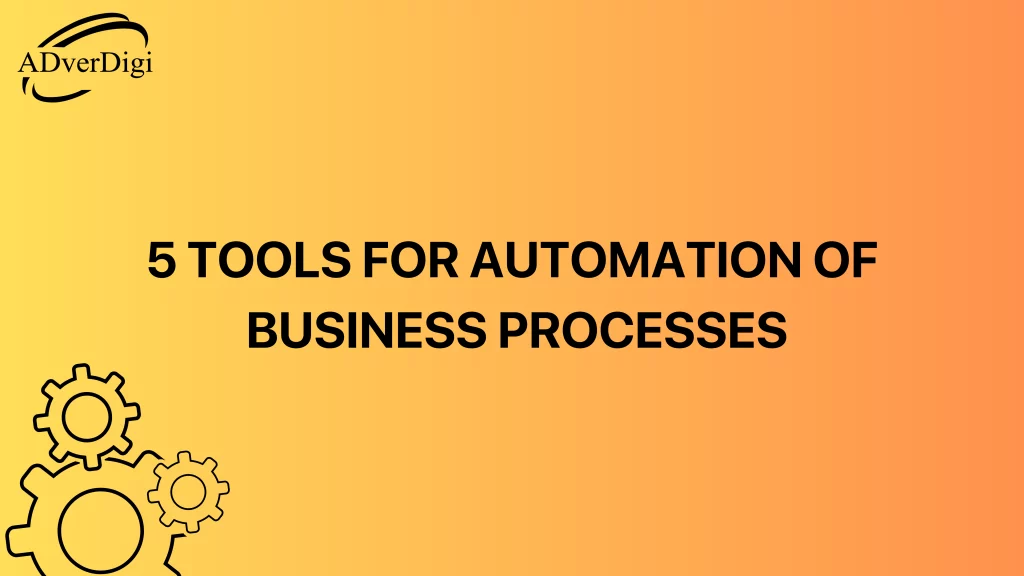5 Marketing tools for automation of business processes
What are marketing tools?
Marketing tools for business-process automation simplify and automate a marketing team’s tedious and complex tasks. These tools can automate email campaigns, social media posts, and ad campaigns, among many other marketing activities. In today’s increasingly digital and connected world, marketing automation tools are essential for marketing departments to engage effectively with potential and existing customers.
For example,
Email marketing automation allows businesses to automate customer segmentation and personalized content to thousands of customers in one go.
Content marketing automation tools allow businesses to plan content ahead of time, coordinate between multiple teams and repurpose existing content to increase brand reach.
Social media marketing automation tools provide powerful targeting capabilities and allow businesses to connect with customers, monitor brand reputation and generate more leads.
These automation tools help marketing departments create, execute, measure, and optimize their campaigns to produce the highest return on their marketing investments consistently. Ultimately, these tools allow marketing teams to focus on creative, engaging content rather than spending all their time and energy managing multiple, time-consuming marketing processes.
How do marketing tools make work easier?
Marketing tools make our work easier by automating tasks that can take longer to complete if done manually. Here are 30 functions that can be automated using marketing tools. Though there are many tasks, here’s the list of 30.
- Identify and build targeted customer lists
- Monitor website analytics
- Automate keyword research
- Publish posts to various social media channels
- Automate content curation and repurposing
- Track customer engagement with email campaigns
- Identify website leads and opportunities
- Run A/B testing of content to see what works best
- Set up online events such as webinars
- Use automation tools to create personalized marketing campaigns
- Automatically syndicate content on third-party platforms
- Monitor the performance of ad campaigns
- Automatically build customized web pages for each lead
- Optimize the speed and performance of websites
- Measure website conversions and traffic sources
- Schedule social media posts
- Automate competitor research and benchmarking
- Integrate landing page creation with email and automation
- Segment audiences based on user behavior and interests
- Schedule and publish targeted messages on Twitter and other networks
- Utilize artificial intelligence (AI) and natural language processing (NLP) to create customized content
- Leverage predictive analytics to anticipate customer needs
- Implement content recommendations to improve conversions
- Automate the distribution of press releases
- Deploy drip campaigns to target potential buyers
- Automate sentiment analysis and sentiment-driven engagement
- Use advanced segmentation techniques to refine target audiences
- Analyze email campaign performance to understand customer preferences
- Generate automated email alerts for product updates and offers
- Create interactive experiences to engage prospects and customers
5 Best Marketing Automation Tools
Are you ready to make marketing a breeze in 2023? The latest and greatest in marketing automation tools can help make the process simpler, faster, and more effective than ever before.
We’ve compiled a list of our top 5 marketing automation tools of 2023 to help get you up to speed. Let’s dive right in!
Drip
Drip provides marketers with automated, personalized messaging, making creating a more meaningful relationship with each customer easier.
Pros of Drip:
- Easily track customer behaviour
- Automatically send customized messages
- Integrates with multiple e-commerce systems
Cons of Drip:
- It may require a steep learning curve
- Expensive monthly fees
- Lack of content marketing support
MailChimp
One of the most well-known marketing automation platforms, MailChimp allows businesses to quickly build automated email campaigns, surveys, and segment customers.
Pros of MailChimp:
- Automatically compiles user contact lists; easily customizes marketing messages; intuitive user interface
Cons of MailChimp:
- It may not be compatible with other tools, offers limited insights into consumer behaviour, and some plans may be pricey.
Marketo
Marketo offers solutions for advanced lead management from the lead’s origin through its life cycle.
Pros of Marketo:
- Lead generation capabilities
- Data-driven analytics
- Robust segmentation
- User-friendly interface
Cons of Marketo:
- Difficult to manage campaigns
- It can be pricey for small businesses
- Automation limits are lower than expected
- Inconsistent integrations with CRM
Autopilot
Autopilot focuses on helping businesses reach new customers, providing helpful features such as journey building and triggers for reaching out at the right time.
Pros of Autopilot:
- Automated campaigns make for effortless marketing
- Offers simple setup and intuitive user experience
- Data is gathered and segmented to personalize campaigns
Cons of Autopilot:
- It can be costly for businesses with complex campaigns
- Limited reporting options and integrations
- Artificial Intelligence capabilities are still in progress
Act-On
This comprehensive platform allows users to build customer journeys and relationships through effective customer-centric communication.
Pros of Act-On:
- Seamless automation allows businesses to spend more time engaging with their customers
- Analytics tools to better track customer data
- Cloud-based, making it easy to access on the go
Cons of Act-On:
- Expensive compared to some other platforms
- Requires a steep learning curve for maximum use
- Limited integration with some third-party applications
-
Conclusion
There are plenty of great marketing tools for promotion. You will find the perfect one depending on your needs and budget.
In conclusion, marketing automation tools are an incredible resource for marketers and businesses looking to boost customer engagement and streamline their marketing processes. By utilizing automated solutions such as segmentation, email marketing, CRM, and analytics, companies can significantly improve their ability to capture, nurture, and convert customers.
5 Marketing tools for automation of business processes Read More »

